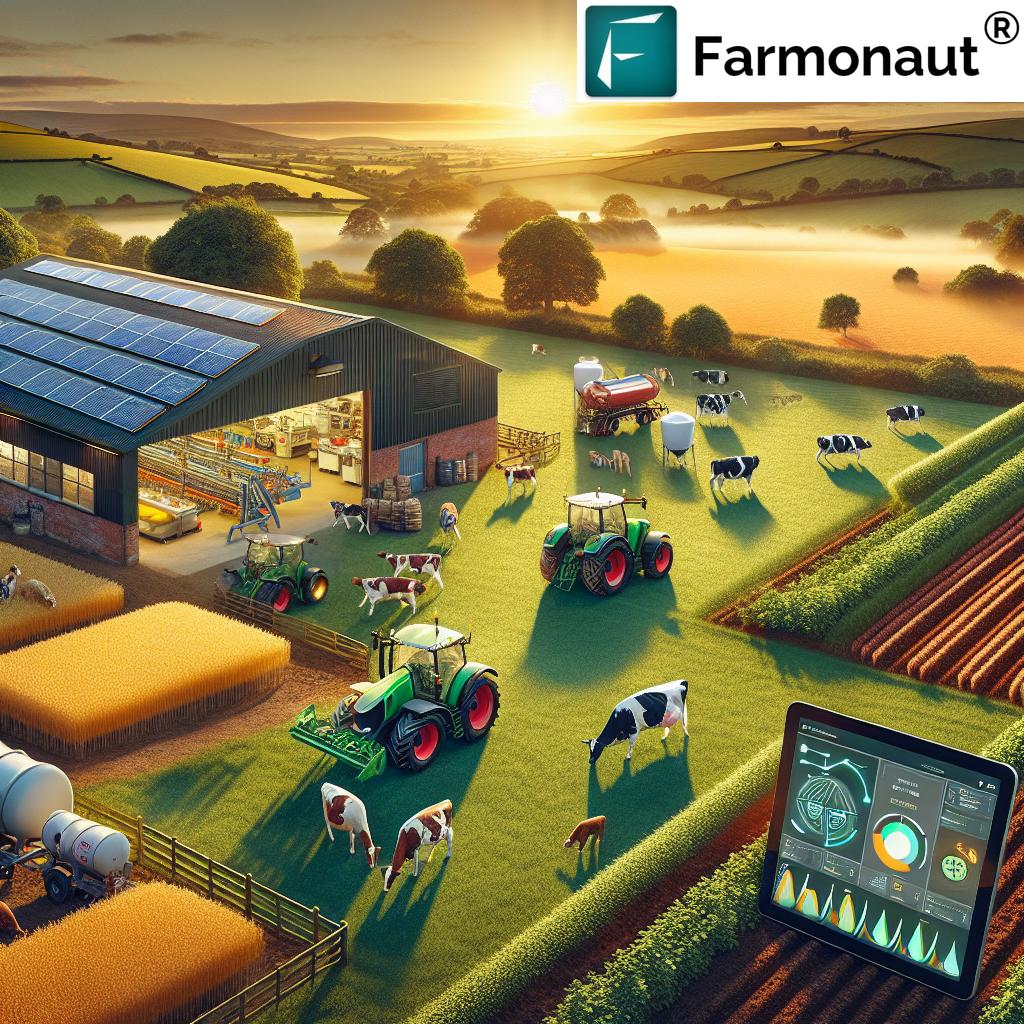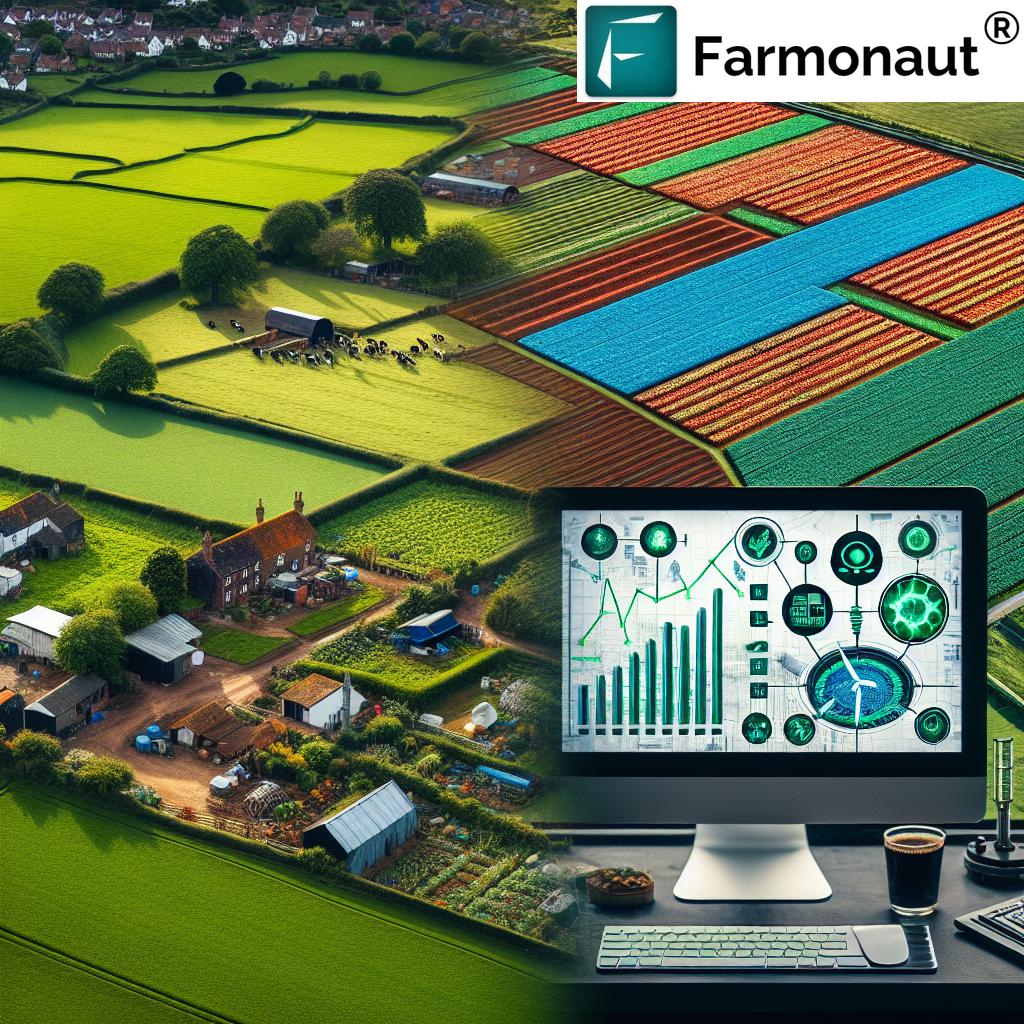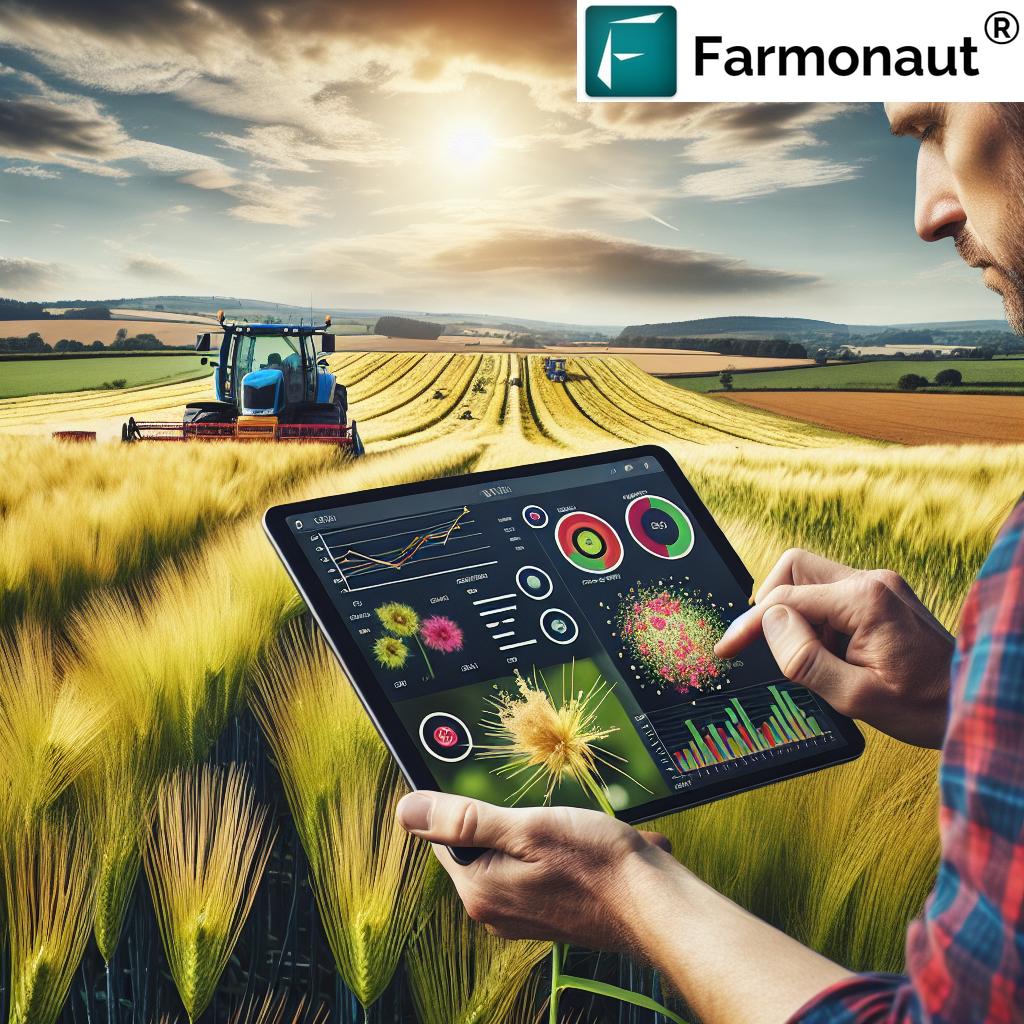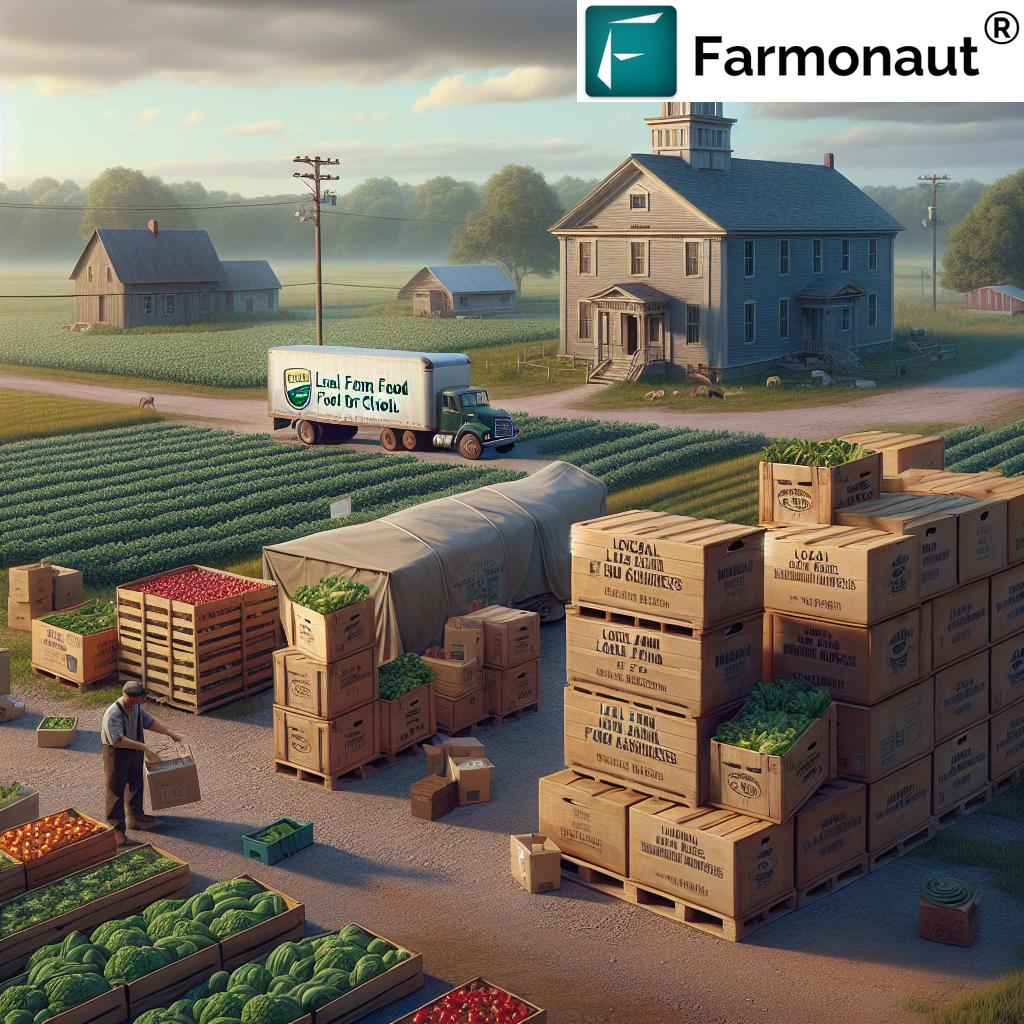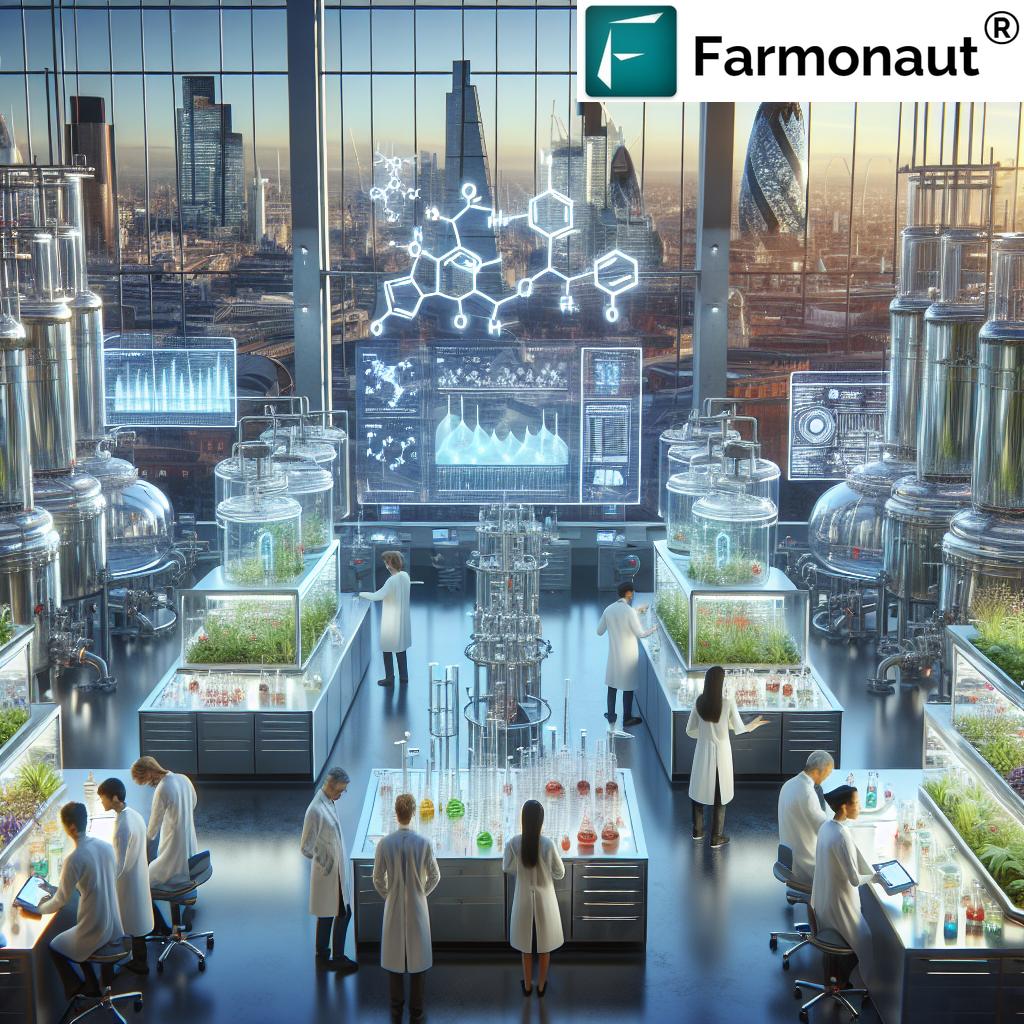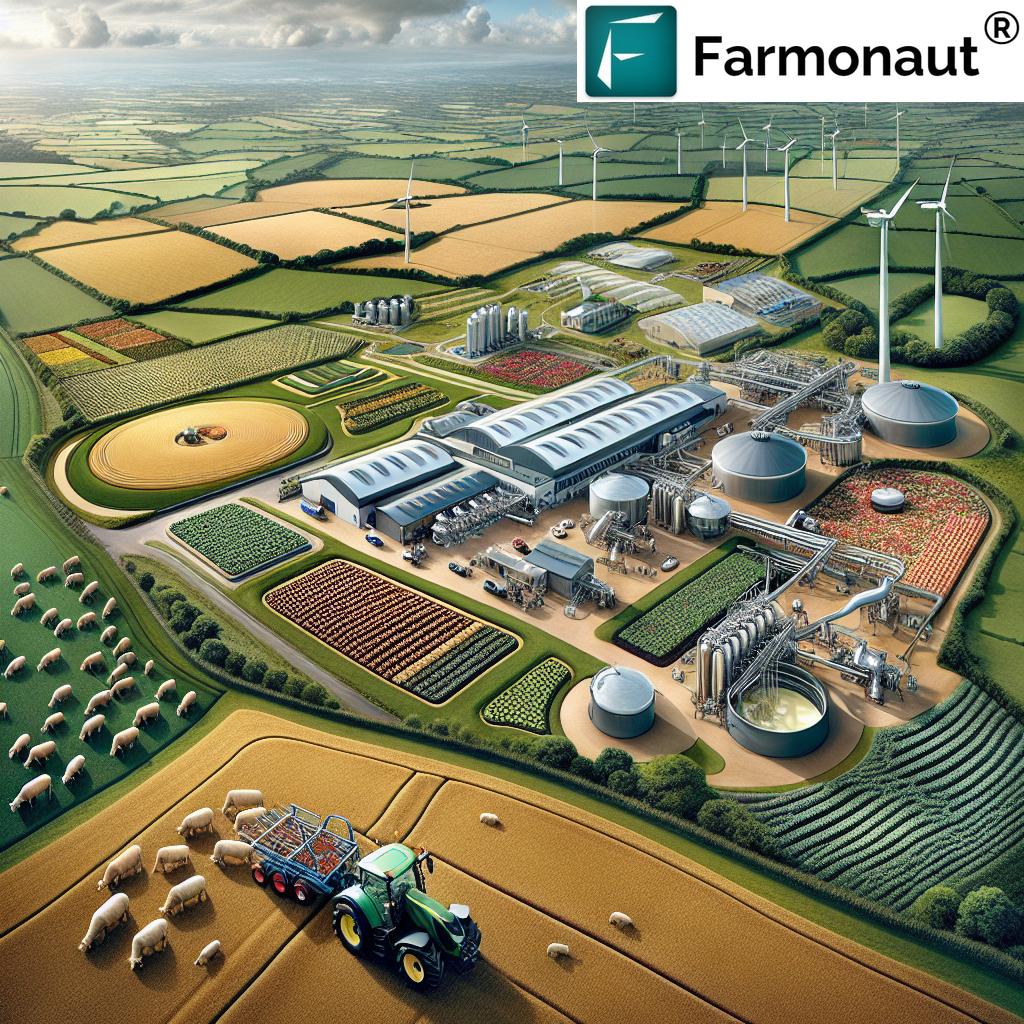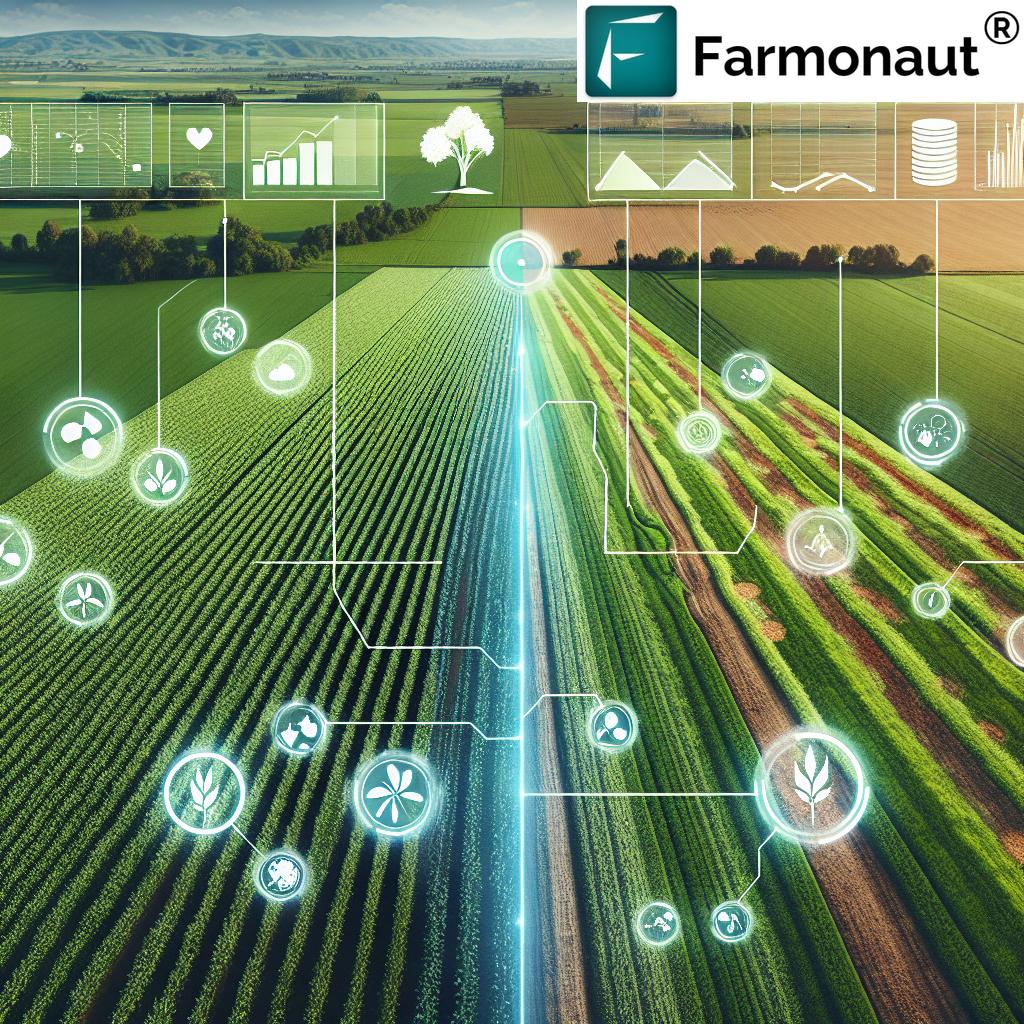Revolutionizing UK Farming: How Precision Agriculture Technology Boosts Crop Yield and Sustainability
“Precision agriculture technology has increased UK crop yields by up to 15% while reducing water usage by 30%, UK farmers report.”
In recent years, we’ve witnessed a remarkable transformation in the agricultural landscape of the United Kingdom. As we delve into the world of precision agriculture technology, we’ll explore how these innovative solutions are reshaping farming practices across England, Scotland, and Wales. From advanced farm management software to cutting-edge agricultural drone technology, we’ll uncover the ways in which digital farming solutions are revolutionizing crop yield optimization and promoting sustainable farming practices.
The Rise of Precision Agriculture in the UK
Precision agriculture technology has emerged as a game-changer for UK farmers, offering a host of benefits that span from increased productivity to reduced environmental impact. By leveraging agricultural data analytics and smart irrigation systems, farmers can now make informed decisions that optimize resource usage and boost crop yields.
- Enhanced crop monitoring through satellite imagery
- Improved soil health monitoring techniques
- Integration of IoT devices for real-time data collection
- AI-powered predictive analytics for crop management
As we explore the impact of these technologies on UK farming, it’s essential to understand the current state of the agricultural industry and the challenges it faces.
The UK Agricultural Landscape: A Snapshot
The United Kingdom’s agricultural sector plays a vital role in the nation’s economy and food security. With a diverse range of farming activities spread across England, Scotland, and Wales, the industry faces unique challenges and opportunities.
- Cereals and oilseeds dominate crop production
- Increasing focus on organic farming practices
- Growing demand for locally sourced produce
- Pressure to reduce carbon footprint and enhance sustainability
In this context, precision agriculture technology offers solutions that address these challenges while boosting productivity and profitability.
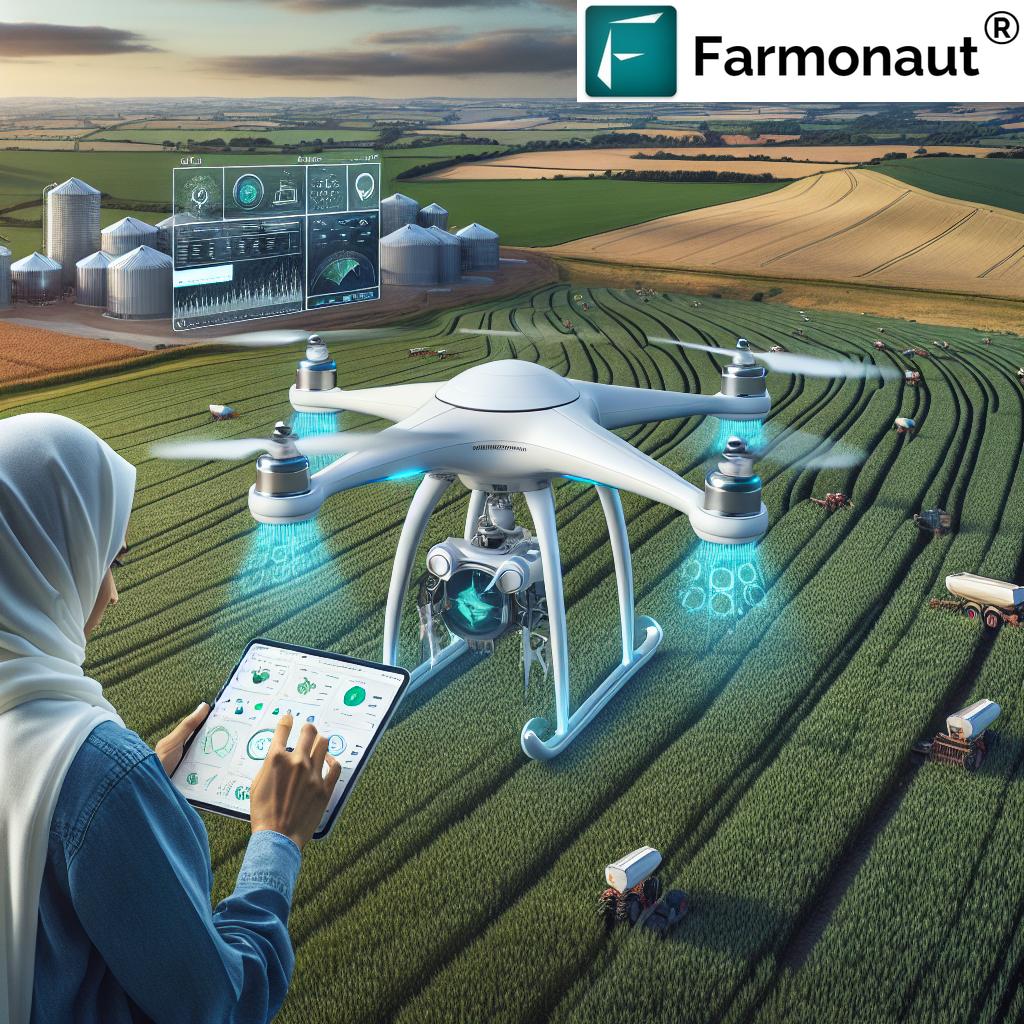
Key Technologies Driving the Agricultural Revolution
The adoption of digital farming solutions in the UK has grown exponentially, with various technologies working in tandem to create a more efficient and sustainable agricultural ecosystem.
1. Farm Management Software
Advanced farm management software has become the cornerstone of precision agriculture in the UK. These platforms integrate various data sources to provide farmers with actionable insights and streamline operations.
- Real-time crop health monitoring
- Weather forecasting and analysis
- Resource allocation and optimization
- Financial management and reporting
One such platform making waves in the UK market is Farmonaut, which offers comprehensive farm management solutions powered by satellite technology and AI.
2. Agricultural Drone Technology
Drones have revolutionized the way UK farmers monitor and manage their crops. These aerial devices provide high-resolution imagery and data collection capabilities that were previously unattainable.
- Crop scouting and health assessment
- Precision spraying of pesticides and fertilizers
- 3D mapping for terrain analysis
- Livestock monitoring in remote areas
3. Smart Irrigation Systems
Water management is crucial in UK farming, and smart irrigation systems have emerged as a key technology for optimizing water usage and improving crop yields.
- Soil moisture sensors for precise watering
- Weather-based irrigation scheduling
- Automated drip irrigation systems
- Remote monitoring and control via mobile apps
4. Soil Health Monitoring
Maintaining soil health is paramount for sustainable farming practices. Advanced soil monitoring technologies help UK farmers make informed decisions about nutrient management and crop rotation.
- Real-time soil nutrient analysis
- pH level monitoring and adjustment
- Soil compaction assessment
- Microbial activity measurement
“The adoption of digital farming solutions in the UK has grown by 40% in the last 5 years, transforming cereal and oilseed production.”
Impact on Key UK Farming Sectors
The adoption of precision agriculture technology has had a significant impact on various farming sectors across the UK. Let’s explore how these innovations are transforming specific areas of agriculture.
Cereal Farming
Cereal crops, including wheat, barley, and oats, are staples of UK agriculture. Precision farming techniques have revolutionized cereal production in several ways:
- Variable rate seeding for optimal plant density
- Precision fertilizer application based on soil nutrient maps
- Targeted pest and disease management
- Yield mapping for continuous improvement
These advancements have led to increased yields, reduced input costs, and improved grain quality across the UK’s cereal-growing regions.
Oilseed Farming
Oilseed rape is a crucial crop in the UK, both for domestic use and exports. Precision agriculture has addressed many challenges faced by oilseed farmers:
- Precise planting depth control for improved germination
- Drone-based pest scouting for early detection of infestations
- Optimized harvesting timing based on moisture content analysis
- Precision application of growth regulators
These technologies have helped stabilize oilseed yields and improve the overall profitability of the sector.
Organic Farming
The organic farming sector in the UK has also benefited from precision agriculture, albeit with a focus on natural and sustainable practices:
- Advanced weed detection and mechanical removal systems
- Precision compost and organic fertilizer application
- Biodiversity monitoring through remote sensing
- Crop rotation optimization using AI algorithms
These technologies have helped organic farmers increase yields while maintaining their commitment to sustainable and chemical-free production methods.
Economic Impact on UK Farming
The adoption of precision agriculture technology has had a profound economic impact on UK farming. Let’s examine some key areas where these innovations have influenced the agricultural economy.
Farmgate Prices and Market Dynamics
Precision agriculture has enabled UK farmers to produce higher quality crops more consistently, which has had a positive effect on farmgate prices. By leveraging data analytics and predictive modeling, farmers can better align their production with market demand, reducing oversupply and stabilizing prices.
Cost Reduction and Efficiency Gains
One of the most significant economic benefits of precision agriculture is the reduction in input costs. By optimizing the use of resources such as water, fertilizers, and pesticides, farmers can substantially lower their operational expenses.
- Reduced fuel consumption through optimized machinery routes
- Lower labor costs due to automation and precision techniques
- Decreased waste of agricultural inputs
- Improved energy efficiency in farm operations
Impact on Exports and Global Competitiveness
The adoption of precision agriculture has enhanced the UK’s position in global agricultural markets. By producing higher quality crops more efficiently, UK farmers have improved their competitiveness on the international stage.
- Increased export opportunities for premium quality produce
- Better alignment with international sustainability standards
- Enhanced traceability for exported goods
- Improved resilience to global market fluctuations
As we continue to embrace these technologies, the UK agricultural sector is well-positioned to maintain its strong presence in the global market.
Environmental Sustainability and Carbon Footprint Reduction
Precision agriculture technology plays a crucial role in promoting sustainable farming practices and reducing the carbon footprint of UK agriculture. Let’s explore how these innovations contribute to environmental stewardship.
Optimizing Resource Use
By leveraging data-driven insights, farmers can significantly reduce their environmental impact through more efficient resource management:
- Precision irrigation systems minimize water waste
- Variable rate technology optimizes fertilizer and pesticide application
- Targeted soil management practices improve soil health and carbon sequestration
- Energy-efficient machinery and operations reduce fossil fuel consumption
Promoting Biodiversity
Precision agriculture technologies enable farmers to create more biodiverse farming environments:
- Precision mapping of wildlife habitats and corridors
- Targeted conservation efforts in high-value ecological areas
- Reduced chemical use leads to healthier ecosystems
- Data-driven crop rotation strategies support soil biodiversity
Carbon Footprint Reduction
The agricultural sector is a significant contributor to greenhouse gas emissions. Precision agriculture offers solutions to reduce this impact:
- Optimized nitrogen management reduces nitrous oxide emissions
- Improved livestock management through precision feeding and monitoring
- Enhanced carbon sequestration through precision soil management
- Reduced fuel consumption in farm operations
By implementing these technologies, UK farmers are not only improving their environmental performance but also aligning with national and global sustainability goals.
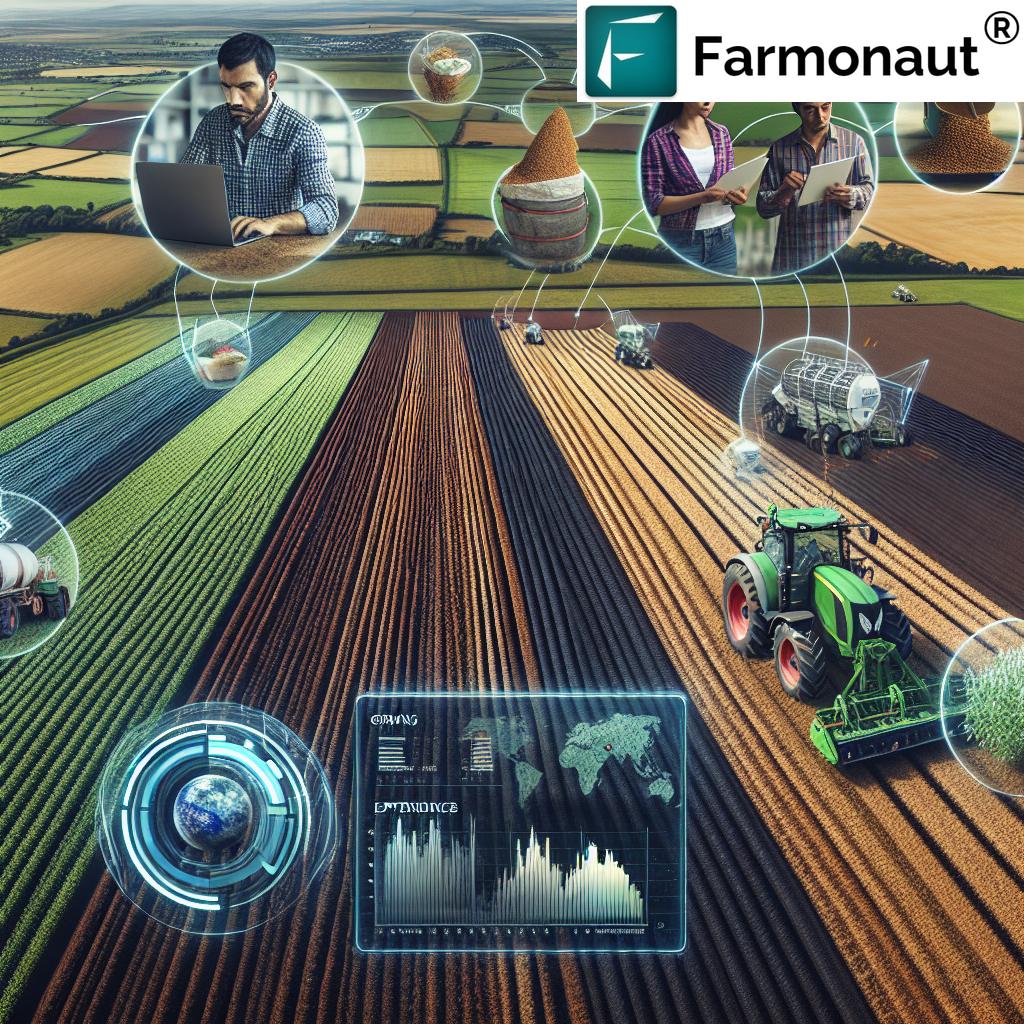
Challenges and Future Outlook
While precision agriculture technology offers numerous benefits, its adoption in the UK faces several challenges. Understanding these obstacles and the future outlook is crucial for continued progress in the sector.
Adoption Barriers
Despite the clear advantages, some UK farmers face hurdles in implementing precision agriculture technologies:
- High initial investment costs for equipment and software
- Limited digital literacy among some farmers
- Concerns about data privacy and security
- Lack of standardization across different technology platforms
Future Trends and Opportunities
Looking ahead, several trends are shaping the future of precision agriculture in the UK:
- Integration of 5G technology for improved connectivity in rural areas
- Advancements in AI and machine learning for more accurate predictions
- Development of blockchain technology for improved traceability
- Increased focus on vertical farming and urban agriculture
As these technologies evolve, we can expect to see even greater improvements in farm productivity, sustainability, and profitability across the UK agricultural sector.
The Role of Government and Industry Support
The successful implementation of precision agriculture technology in the UK relies heavily on support from both government and industry stakeholders. Let’s examine the current landscape of support and future initiatives.
Government Initiatives
The UK government has recognized the importance of precision agriculture in achieving its agricultural and environmental goals:
- Funding for research and development in agri-tech innovations
- Grants and subsidies for farmers adopting precision agriculture technologies
- Development of policies to support data sharing and standardization
- Investment in rural broadband infrastructure to support digital farming
Industry Collaboration
Collaboration between technology providers, agricultural organizations, and farmers is crucial for the advancement of precision agriculture:
- Partnerships between tech companies and agricultural research institutions
- Industry-led training programs for farmers on new technologies
- Development of industry standards for data interoperability
- Creation of farmer-led innovation networks and knowledge sharing platforms
These collaborative efforts are essential in driving the widespread adoption of precision agriculture across the UK.
Case Study: Farmonaut’s Impact on UK Farming
As we explore the landscape of precision agriculture in the UK, it’s worth highlighting the contributions of innovative companies like Farmonaut. This agricultural technology company has been at the forefront of revolutionizing farming practices through its advanced satellite-based farm management solutions.
Farmonaut’s Technology Suite
Farmonaut offers a comprehensive range of tools that address various aspects of precision agriculture:
- Satellite-Based Crop Health Monitoring: Provides real-time insights into vegetation health and soil moisture levels
- Jeevn AI Advisory System: Delivers personalized farm advice based on AI analysis of satellite data
- Blockchain-Based Product Traceability: Ensures transparency and security in agricultural supply chains
- Fleet and Resource Management: Optimizes logistics and machinery usage for improved efficiency
- Carbon Footprinting: Helps agribusinesses monitor and reduce their environmental impact
These technologies align perfectly with the needs of UK farmers seeking to enhance their productivity and sustainability.
Accessibility and Adoption
One of Farmonaut’s key strengths is its focus on making precision agriculture accessible to farmers of all scales:
- Subscription-based model with flexible pricing tiers
- User-friendly web and mobile applications
- API access for integration with existing farm management systems
- Partnerships with financial institutions to improve access to agricultural financing
By lowering the barriers to entry, Farmonaut is playing a crucial role in accelerating the adoption of precision agriculture across the UK.
For more information on Farmonaut’s offerings, visit their web application or explore their API documentation.
Comparative Analysis: Traditional vs. Precision Agriculture
To fully appreciate the impact of precision agriculture technology on UK farming, let’s compare traditional farming methods with modern precision techniques across key performance indicators.
| Metric | Traditional Farming | Precision Agriculture |
|---|---|---|
| Average Crop Yield (tons/hectare) | 7.5 | 9.0 |
| Water Usage Efficiency (%) | 60 | 85 |
| Fertilizer Application Accuracy (%) | 70 | 95 |
| Pest Management Effectiveness (%) | 75 | 90 |
| Soil Health Improvement (%) | 5 | 20 |
| Carbon Footprint Reduction (%) | 0 | 25 |
| Labour Cost Savings (%) | 0 | 30 |
| Overall Farm Profitability Increase (%) | 0 | 20 |
This comparison clearly demonstrates the significant improvements that precision agriculture brings to UK farming practices. From increased crop yields to substantial reductions in resource usage and environmental impact, the benefits of adopting these technologies are undeniable.
The Future of UK Agriculture: Embracing Digital Transformation
As we look to the future, it’s clear that the continued adoption and development of precision agriculture technology will play a crucial role in shaping the UK’s agricultural landscape. The integration of these innovative solutions is not just a trend but a necessity for ensuring food security, environmental sustainability, and economic viability in the face of global challenges.
Emerging Technologies
Several cutting-edge technologies are set to further revolutionize UK farming in the coming years:
- Edge computing for real-time data processing in the field
- Advanced robotics for autonomous farming operations
- Gene editing techniques for crop resilience and yield improvement
- Quantum sensors for ultra-precise soil and crop analysis
Policy and Regulatory Landscape
The UK government’s approach to agricultural policy will significantly influence the adoption of precision farming techniques:
- Development of a national data strategy for agriculture
- Regulatory frameworks for the use of AI and robotics in farming
- Incentives for farmers adopting sustainable, tech-driven practices
- International cooperation on agricultural technology standards
Skills and Education
Preparing the next generation of UK farmers for a digitally-driven agricultural sector is crucial:
- Integration of agri-tech courses in agricultural education programs
- Continuous professional development for existing farmers
- Collaboration between tech companies and educational institutions
- Promotion of STEM subjects in rural schools
By focusing on these areas, the UK can ensure that its agricultural sector remains at the forefront of innovation, productivity, and sustainability.
Conclusion: A New Era for UK Agriculture
As we’ve explored throughout this blog post, precision agriculture technology is truly revolutionizing UK farming practices. From boosting crop yields and optimizing resource use to reducing environmental impact and enhancing economic viability, these innovative solutions are transforming every aspect of the agricultural sector.
The adoption of digital farming solutions, smart irrigation systems, and agricultural drone technology is not just improving farm management but also addressing critical challenges such as climate change, food security, and rural economic development. Companies like Farmonaut are playing a pivotal role in this transformation, making advanced technologies accessible to farmers of all scales.
As we look to the future, it’s clear that the continued integration of precision agriculture technology will be essential for the UK’s agricultural sector to thrive in an increasingly complex and challenging global environment. By embracing these innovations, UK farmers are not only enhancing their own operations but also contributing to a more sustainable and productive future for agriculture worldwide.
The journey towards a fully digitalized and precision-driven agricultural sector in the UK is well underway. As farmers, policymakers, technology providers, and researchers continue to collaborate and innovate, we can look forward to a future where UK agriculture is more efficient, sustainable, and resilient than ever before.
FAQs
- What is precision agriculture technology?
Precision agriculture technology refers to the use of advanced tools and techniques, such as GPS, sensors, robotics, and data analytics, to optimize farming practices for increased efficiency and productivity. - How does precision agriculture benefit UK farmers?
It helps farmers increase crop yields, reduce input costs, improve sustainability, and make more informed decisions through data-driven insights. - What role do drones play in precision agriculture?
Drones are used for crop monitoring, pest detection, precision spraying, and creating detailed maps of farmland to aid in decision-making. - How does precision agriculture contribute to sustainability?
By optimizing resource use, reducing chemical inputs, and improving soil health, precision agriculture significantly reduces the environmental impact of farming. - What are the main challenges in adopting precision agriculture in the UK?
Key challenges include high initial costs, digital literacy among farmers, data privacy concerns, and the need for improved rural connectivity.
Explore Farmonaut’s precision agriculture solutions:






